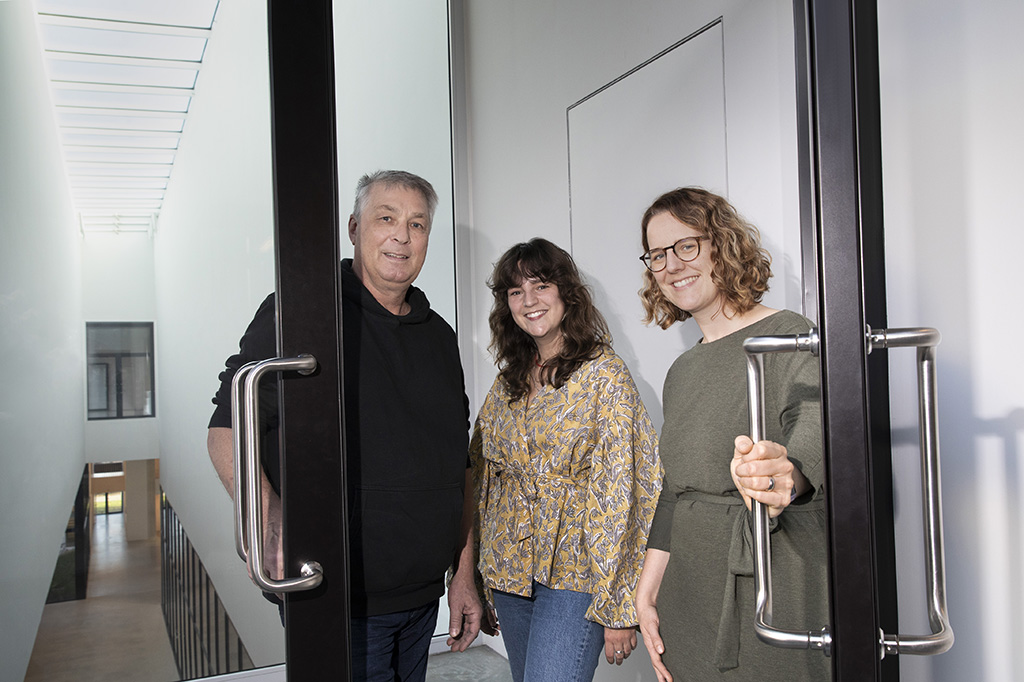Breaking generational poverty: ‘Chaos in your head usually means chaos in your house’
Children who grow up in poverty often end up in a similar situation as adults. Tilburg Scientists want to break through this vicious circle in the The Sterkste Schakel (Strongest Link) project. By making use of neuropsychological insights and intensive guidance, they help parents to get a grip on their future. Starting in the Waalwijk Municipality.

Living with money worries is often a matter of living day by day. Making wise decisions for the future often proves difficult for people who have to live on (too) little. As a result, their lack of money all too often becomes chronic.
Researchers Marion van den Heuvel and Robin van Woensel (Tilburg University) and family coach Dick van Engelen (Waalwijk Municipality) try, in the project the Sterkste Schakel, to map out and strengthen the social and financial self-sufficiency of Waalwijk families. Not by telling them what they need to change, but by listening carefully and observing them for a while.
Dick van Engelen: family coach
“There are moments when you walk into someone’s living room and think: wow! The week before it was a big mess and now it’s all tidied up and neatly painted. When people make that kind of progress, that’s just super nice.
“Participants come to us via the social support department of the Waalwijk Municipality. For example, if they are looking for help after a divorce to get their lives back on track and it soon becomes clear that they also have a lot of debts. Only families can participate, so one or two parents with growing children. Composite households, single parents, or traditional, it doesn’t matter. However, there must be a financial shortage.

“We aren’t talking about poverty. The image that this term conjures up creates a barrier for participation. ‘I’m not living in poverty, because I manage to make ends meet every month,’ you hear. Yes, that’s true, but then nothing should go wrong, otherwise you quickly find yourself in financial difficulties.
“Our last participant is such a person. She worked her ass off and had amassed some nice savings. Until her son started working and also brought in an income. The tax authorities immediately stopped all benefits and claimed everything back from the previous year.
“In one go, Mrs. B. had lost all her savings and was now below the poverty line. So, this is a family that, on the face of it, is well off: a decent home, a small car, the children well dressed, and the house looks tidy. And yet, it appears to be a very vulnerable situation.
“The first step we take is to reduce chronic financial stress. That’s where the greatest turmoil is. Chaos in your head almost always means chaos in your house. Clutter is everywhere. The piles of mail lie unopened among the advertising brochures. That is why we start with order: what is wastepaper, what is relevant mail, what can be thrown away? By mapping out income, expenses, and debts, an overview is created.
“Planning, organizing, and making decisions are difficult under conditions of chronic unrest. People sometimes make choices that are difficult to understand. Buying a car or flat screen TV when there’s no money. Is that smart? I don’t have an opinion on that, or at least I don’t ventilate it. I ask the question: what can you do to pay for that thing? What kind of job should you get? And is that job sufficient to pay the recurring expenses and the car? I offer coaching in that area.
“If you succeed in reducing the chronic stress, you notice that space is created for other things. People start paying attention to their surroundings again. Emptying a full shed, finding a decent sofa on eBay. These are also steps that I take together with participants to get them moving again. But ultimately, of course, they have to take matters into their own hands.
Poverty in the Netherlands
What is it like to live in poverty? What does poverty look like nowadays and what can you do about it? This Christmas period, Univers pays special attention to poverty in the Netherlands. People in need of money will be interviewed as well as scientists. Together, they paint a picture of a problem which, unfortunately, is still a long way off from being solved.
This series was made possible with the help of Quiet 500, an organization dedicated to helping people in situations of poverty in the Netherlands. Do you want to help? Visit the website and see what you can do.
“After the ‘phase of taking away worries,’ we enter the phase of progress. We examine: who are you, what is important to you and which direction do you want your life to go? I help them to turn this into a concrete goal. Formulating your own goals and taking tiny steps forward, it leads to an enormous feeling of motivation and initiative.
“The final step is to achieve financial self-sufficiency. For some people that means, I manage my finances and never get into debt again. For the other: I continue to find it very difficult, and I’m happy with an administrator who makes sure I get money to live on. For both instances, the vicious circle in which people were trapped was broken, and a structural change in behavior was achieved.
“Sometimes there is also disappointment. You think you have things well in hand, but then after an incident someone takes a big step back. Still, for me this is a dream job.
“I’ve been working in healthcare for 43 years, but after two severe burn-outs I thought: I don’t want this anymore, I need to find something else. Early retirement, a job in another department? Until a manager pointed me to this job. I read the vacancy and thought, it actually says ‘It’s you we want!’ I am at the end of my working life and the fact that I can do this now is a godsend. It’s the most beautiful job in the whole world.”
Marion van den Heuvel: neuropsychologist and principal researcher
“It is important that people know more about how our brain works under severe financial stress. So that there is more understanding of so-called ‘stupid’ decisions people sometimes make. Not paying your bills or buying an expensive dress when you don’t have enough money for groceries. From the point of view of a malfunctioning brain, these actions are not that strange.
“At the front of your brain, behind your eyes, is the prefrontal cortex. A lobe that is very important for the skills that allow you to perform purposeful behavior. Executive skills we call them. Keeping track of your finances, going shopping, cooking a healthy meal. Or not doing something, holding back. You may feel like buying new clothes but decide that’s not a good idea right now. Executive skills are important to make sure things work out in your life.

“The moment you have a lot of worries about money, those skills become less and less. Not because you don’t have them, but because of stress hormones, this part of the brain functions less well. Other areas take over and remain in activity mode. There constantly is a brain area that shouts: there is danger, help, we must do something!
“You become exhausted from the stress and also suffer from a lack of sleep. You end up in a survival mode. In this mode, it is very difficult to make wise choices for the long term. You mainly start thinking in the short term: I’m hungry now and I’ll go for a fatty snack.
“With generational poverty, we see that if parents come from poverty, there is a good chance that the child will end up there as well. Various studies have shown that it is very difficult for a child to extricate itself from this.
“Lack of money and the associated stress affects an (un)born child in many ways. As a result, the baby starts off at a considerable disadvantage in the womb. It has a less fit mother with an excessively high heart rate and blood pressure, who often eats unhealthily and produces a lot of stress hormones.
“After birth, the child grows up with less nutritious food and less good stuff, and with stressed or depressed parents who may respond less sensitively to children’s needs. You see the consequences of this not only in the brain, but in the entire child’s body. Growing up in a family with serious money worries is something they take with them for the rest of their lives.
“Sometimes people say that poverty is someone’s own fault, or that you should just grab your chances. Those kinds of comments make me very angry. It’s not a fair start at all. People who come from a situation of poverty have to work much harder to get somewhere. I really think that we need to take people by the hand more, support them, to get them out of poverty. That’s what I’d like to make a case for.
“I have written many fine publications in recent years. Yet, I often wondered: who is actually going to read this? So, I’m looking for projects that bring you closer to people. Research that gets something done. This project is very useful and, if the results are good, we want to extend it to other municipalities. Ideally, there will be a family coach in every municipality.”
Robin van Woensel: project coordinator and junior researcher
“Recently, I had an intake interview with a new participant, and she said, ‘I come from a family that has always lived in poverty. I’ve never been as rich as I am now, but it doesn’t feel like it. I constantly wonder if we’re going to make it.’
“With her I see subjective poverty. She has enough to live on, as long as no unexpected things happen, and yet, there are always these money worries. The ever-present fear that you won’t have enough. She really inherited that from her parents.
“When my parents divorced, I also lived in financial scarcity for a few years as a child. We often went to my grandparents for dinner. Not just for fun but because there was little at home. That is why what I hear affects me. I know what they are going through and I know how children can feel. You don’t wish that on anyone.
“That financial pressure, they definitely get that, also in the way the parents raise their children. If you have a lot on your mind and your son or daughter keeps asking: mama, mama, mama? Then you can imagine that someone will react more fiercely: leave me alone! You have less space to pay attention to your child and to give love. Children can feel that.

“The family coach, Dick, works from a stress-sensitive approach, among other things, by acknowledging that the stress is there: ‘I notice that your stress level is very high, shall we discuss this first? Then we will see what we can do for the rest of the day.
“He also literally helps them to solve problems they cannot solve themselves, such as tidying up an overflowing shed or looking for another washing machine because the old one is broken.
“The family coach is going to assist them instead of them having to do it all themselves. In this way, we try to create stability. Peace of mind, so that we can then work on executive skills such as planning, organizing, and self-regulation.
“Participants can receive coaching for three years. From the start of participation, I take neuropsychological tests at set times. Not only the parents fill out these tests but also the children, provided they are old enough. They play various games to map out attention span and working memory, but they also fill out questionnaires about health and quality of life.
“We hope to see after those three years that everyone gets better at those executive skills and reports a higher quality of life. Less brooding, feeling happier with themselves. Also, of course, we want to know if they are having and experiencing fewer money problems.
“The fact that I struggled for a while as a child, I often saw as a negative thing. In this project, it works to my advantage. When I go to people’s homes, they feel at ease with me. They immediately start talking and are not ashamed.
“Many of us can find ourselves in a situation of money worries, though we don’t always realize it. My parent got divorced at the time of the financial crisis in 2008. We owned our house, my father had his own business, and my mother had a good job. But the company collapsed, my mother became ill from the stress, and the house proved unsaleable. Then things happen very quickly. Then suddenly there’s nothing left.”






